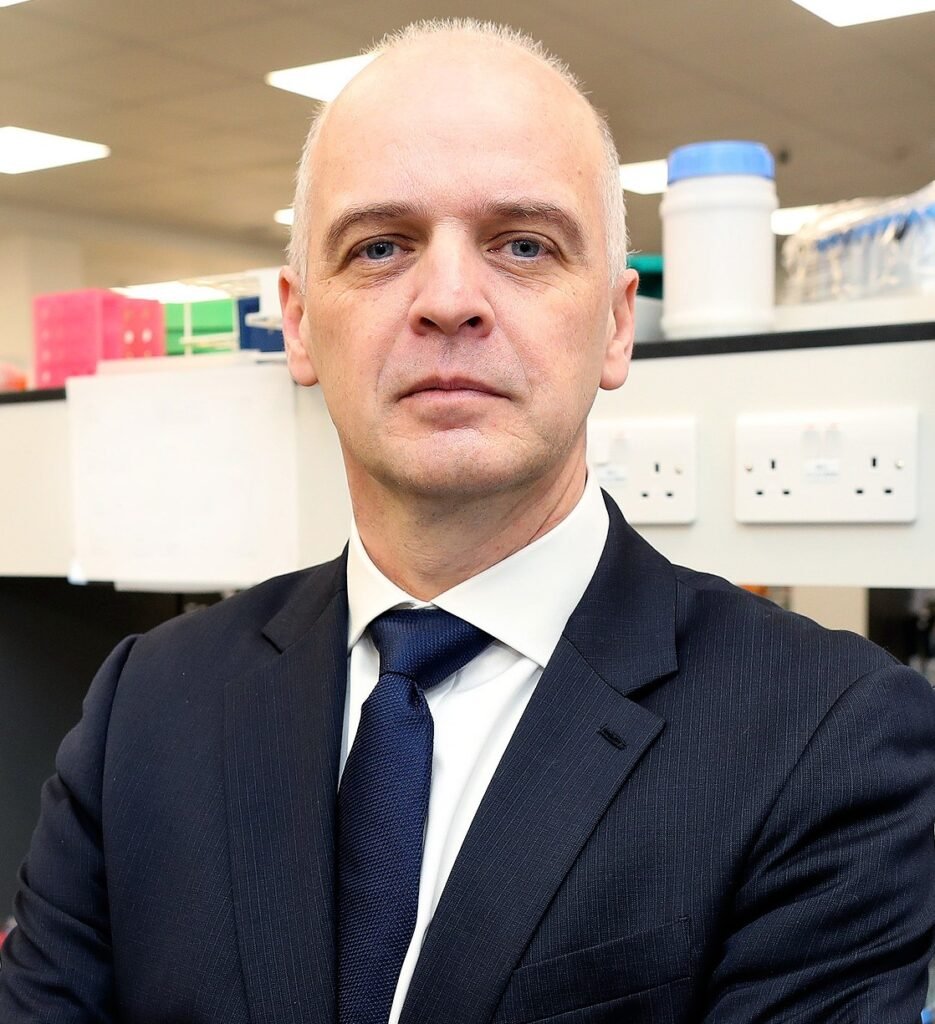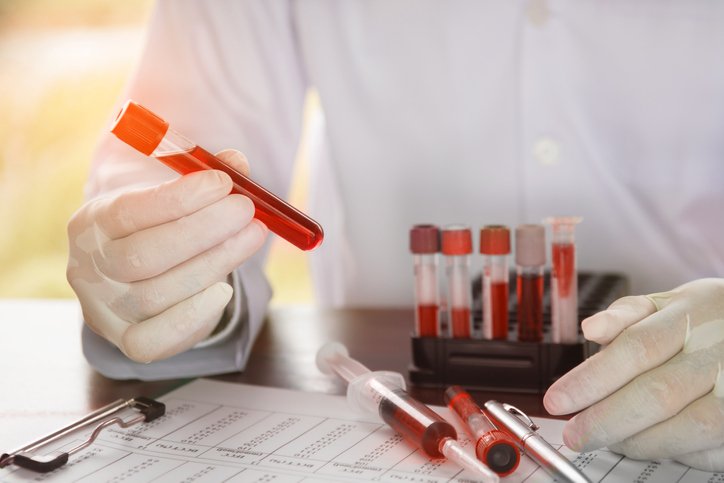Consultant Haematologist Prof James O’Donnell speaks with Pat Kelly about new breakthrough research, which could identify those patients at highest risk of severe complications from Covid-19 and open the door for personalised treatment
New research led by the RCSI University of Medicine and Health Science, in collaboration with a number of other centres, has the potential to help clinicians understand why patients with Covid-19 develop blood-clotting abnormalities that trigger micro-clots in the lungs.
The work was focused primarily on patients with severe Covid-19 and found that elevated levels of the blood biomarker Von Willebrand factor peptide is linked to more severe disease and worse outcomes in hospitalised patients with Covid-19.
Previous studies have shown that the development of these micro-clots results in a poorer prognosis for patients and an increased risk of intensive care unit (ICU) admission. The authors of this new research hope that their findings will help clinicians to stratify patients at risk of developing severe thrombotic and respiratory complications, and their work was published recently in the British Journal of Haematology.
Von Willebrand factor peptide is an established blood marker for damage to the endothelial cells lining the blood vessels in the body and the new study links the formation of these micro-clots to elevated levels of this marker.
Acute damage to the endothelial cells results in not only the rapid release of Von Willebrand factor peptide, but also initiates clot formation and inflammation. The researchers noted the highest levels of the blood marker were present in patients with the most severe cases of Covid-19 or those who had died from the virus, indicating that levels of the marker may be predictive of poor prognosis and outcomes in infected patients.
Potential
One of the researchers, Prof James O’Donnell, is Director of the Irish Centre for Vascular Biology at the RCSI and Consultant Haematologist in the National Coagulation Centre in St James’s Hospital, Dublin. He spoke with the Medical Independent (MI) about the translational potential for the research and how the findings could identify and improve outcomes for patients with severe Covid-19 infection.

Prof O’Donnell commented on the difficulty of variations in symptoms among those who become Covid-infected. “One of the problems we have with Covid is that some people have very mild infections, whilst other people become really sick, and we don’t fully understand the biology that explains that individual variation,” he said.
“If we had some good biomarkers whereby we could identify at an early stage the people who are going to do badly, then we would have the prospect of changing the way we treat those people. It comes back to that idea that a ‘one-size-fits-all’ approach is not going to work for a condition in which people respond in very different ways.
“So we really need to understand what is going on in individual people and then have the ability to personalise treatment, or at least be able to identify groups of patients who are either going to do well or do badly, then we could design [a system] whereby we could test different things for high-risk people, and other things in low-risk people.”
Considering the pressure the health system is currently experiencing, Prof O’Donnell was asked about the capacity to implement personalised medicine for Covid-19 patients and risk-stratify each patient individually. “I think we do have the resources to do it, but the problem at the moment is – as everybody knows well – at this time last year, nobody had even heard of this condition,” he said.
“Here we are 12 months later and treatment has moved on significantly, but we are still ‘chasing the game’ to some extent. What we really need to do is stratify the clinical trials; if we could identify the people in the clinical trials who have a poor prognosis from the beginning, we can design trials where we are not just giving the same treatment to everyone and where we can target particular treatments to particular people.”
Prof O’Donnell explained that the reason some people with Covid-19 do badly is because they have a very marked inflammatory response to the virus. “If we could single those people out, we could ensure that they get different anti-inflammatory options to make sure they get the one that works best,” he told MI.
“What our study is about is, we know that the endothelial cells lining the blood vessels are really key in this condition, so what we are looking for is a marker that could be useful to pick out people in whom that endothelial response is markedly exaggerated. That would allow us to try different things to try to control it.”
If these particular patients could be identified, with regard to treatment options, Prof O’Donnell commented: “We don’t really have good endothelial cell stabilisers, to use that term.
“We don’t have specific treatments that target endothelial cells, but some things do work – even simple things like anti-inflammatory therapies; for example, even aspirin might have a role in trying to down-regulate the endothelial cell response.
“Anticoagulant therapy could also be important, because we know that some of the blood-clotting proteins activate endothelial cells. In addition, there is a whole range of cytokines that drive endothelial cell damage, so again, anything that would target specific pro-inflammatory cytokines could be useful – cytokines such as TNF, IL-1 and IL-6 are all implicated and are important in this context,” he said.
“There is also a complement activation pathway that damages endothelial cells, which is also something that could be targeted, and finally, it seems like the virus can actually infect endothelial cells, which is probably one of the reasons why it has this unique clotting abnormality.”
Unique properties
One of the biggest challenges facing physicians when trying to decipher Covid-19 has indeed been the question of whether it is simply another harmful viral pneumonia and whether or not it has unique properties, explained Prof O’Donnell.
“The more we look at it, the more we think it really does have properties that we have not seen with other viral infections that cause people to end up in intensive care,” he said, “and one of those properties is that this virus can get into endothelial cells.”
Prof O’Donnell also addressed the perception among certain members of the public that Covid-19 is simply another strain of pneumonia, and the need to highlight the fact that this virus has unique destructive properties and threats to life and wellbeing.
“There is really no question now – this isn’t ‘just another flu’,” he said. “There have been post-mortem studies done across the world and even from the earliest post-mortem studies, it has been shown that in people who die from Covid-19, when they look at the lungs, the small blood vessels in the lungs are full of blood clots.
We do not see that in people who die from other viral pneumonia infections, so there is something unique happening within the blood vessels in the lungs of these patients. We don’t really understand the biology yet, but it is definitely not the same as other viral pneumonias.”
One of the remarkable aspects of Prof O’Donnell’s research is the range of facilities that were involved in the work – the Irish Centre for Vascular Biology; the School of Pharmacy and Biomolecular Sciences at the RCSI; the Department of Anaesthesia and Critical Care at the RCSI; the Department of Infectious Diseases in Beaumont Hospital, Dublin; the National Coagulation Centre at St James’s Hospital in Dublin; Trinity College Dublin; St Vincent’s University Hospital in Dublin; and the National Children’s Research Centre at Children’s Health Ireland, Crumlin.
“That [wide collaboration] is something I firmly believe in,” commented Prof O’Donnell. “Ireland is a small country and I believe that all the universities and hospitals should be working together if we really want to have world-class research.”
Arising from Prof O’Donnell’s research in collaboration with his colleagues, it is notable that many of the therapies to treat the inflammatory nature of Covid-19 already exist, such as TNF inhibitors. “Some of these therapies have already been trialled. Some of the problems with the trials is that they take people with Covid-19 and basically treat them all in the same way, as the same group,” he explained.
“What our data suggests is that within the broad mix of people who are unwell with Covid, there are different sub-populations, so if you just give an anti-cytokine to everybody, you may miss the signal. However, if you could target the right subgroup, there may be a stronger effect of an anti-cytokine in the right subgroup.”
‘Hallmark’ disease process
Regarding the vaccine roll-out, Prof O’Donnell expressed his hopes that less people will experience the more severe effects of the virus following widespread vaccination. “We have no data yet but… I have no doubt that a lot of Covid coagulation problems and endothelial cell problems that we see are immune-related, so if we can dampen the immune response in people, that can only be a good thing.”
He referred to the MERS-CoV and SARS-CoV-1 outbreaks where post-mortem examinations also showed evidence of very similar lung-vascular problems, which may place added significance to the work being done by Prof O’Donnell and his colleagues. “Who knows when the next virus in this family is going to appear, but based on what we know, [the next virus] could easily cause lung vessel blood clots too… this could be a hallmark disease process with this family of viruses.”
Prof O’Donnell was asked how he would like his research to be used to inform policymakers. “My strong feeling is that they need to invest money into understanding better what is happening,” he told MI.
“If we better understand what is happening, then we can stratify the patients to have the best clinical trials and we can design targeted treatments so that we can work towards that idea of personalised treatment, so investment of funding into basic scientific research in this area is critical – that’s how we got a vaccine in the first place.”
Regarding follow-on research, Prof O’Donnell said: “We are trying to work out how the Covid virus damages the endothelial cells in the lungs, so we are interested in what the pathways are, what the cytokines are, because we think that the endothelial cells lining the blood vessels are a key driver of what we see in Covid-19. So we are really trying to dissect the biology underlying that observation.”













Leave a Reply
You must be logged in to post a comment.